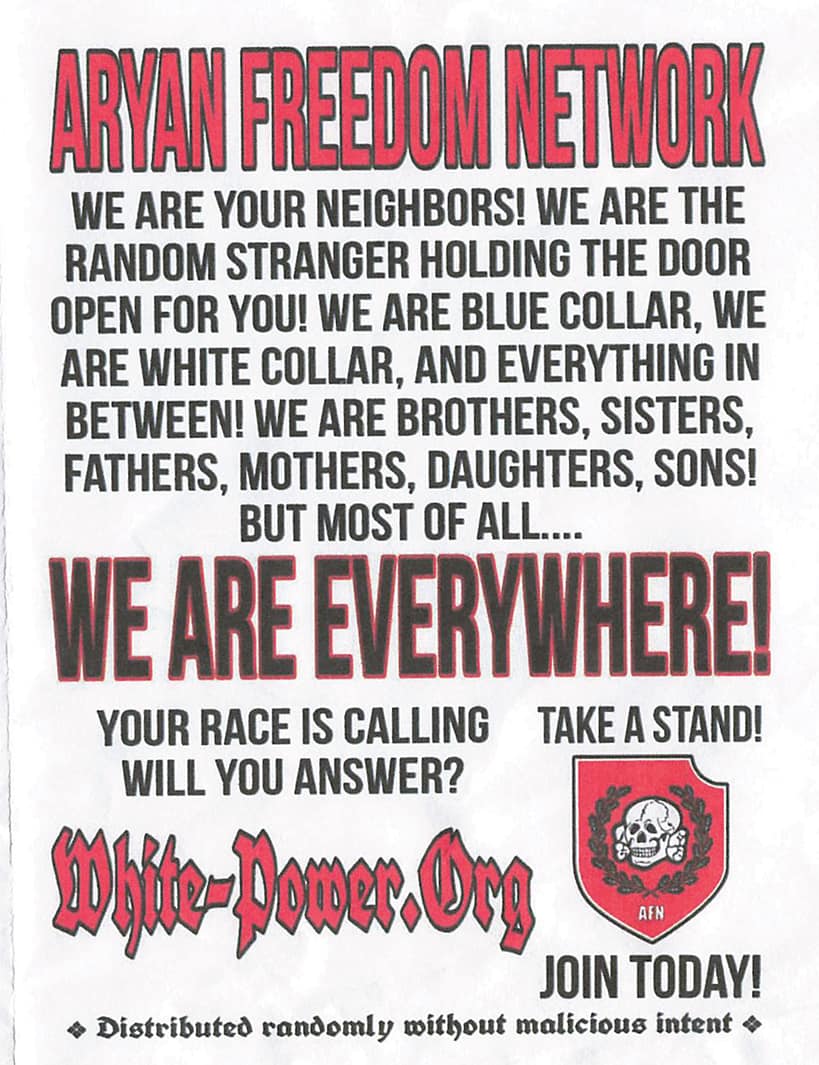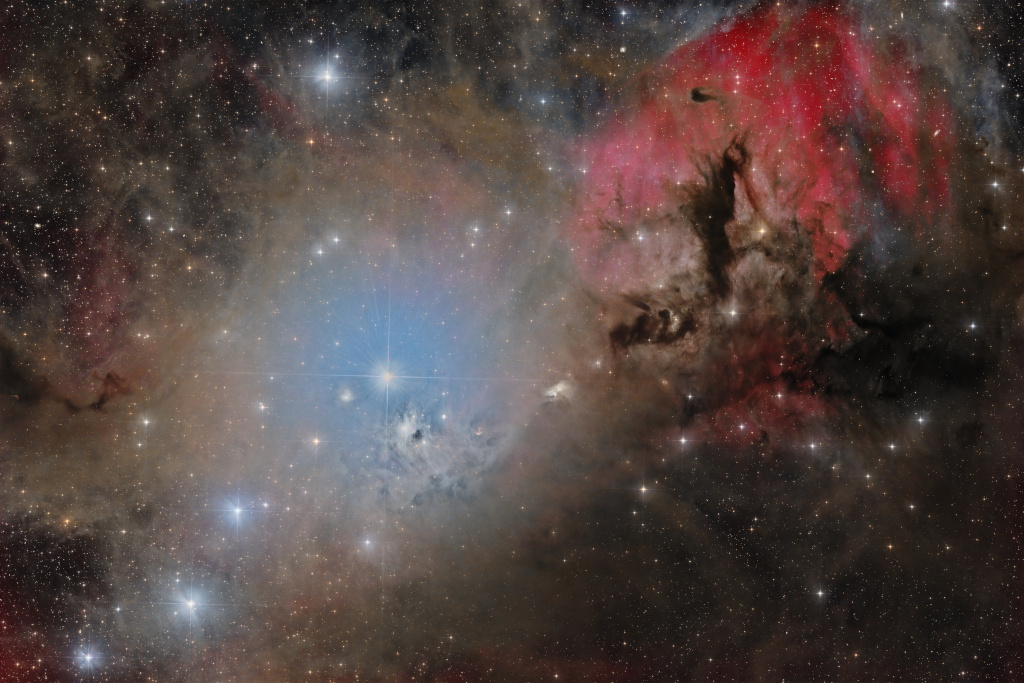Blog
Gus Johnson (November 15, 1913– February 6, 2000) was an American swing drummer in various jazz bands, born in Tyler, Texas, United States. After learning to play drums from his next-door neighbor, Johnson occasionally played professionally at the age of ten in the Lincoln Theater, and performed in various local groups, most notable McDavid’s Blue Rhythm Band. Upon graduating from Booker T. Washington High School, Johnson moved to Kansas City, where he took up drumming full-time. He joined Jay McShann‘s Orchestra in 1938, with his music career being interrupted by his conscription into the military in 1943.
more...Friday November 15th 2024 6pm. Erev Shabbat Service: The Religious Imperative to Welcome the Stranger at Temple Israel music with Inbal Sharett-Singer, Jayson Rodovsky, Jeff Bailey, Pete Whitman and mick LaBriola.
more...A mere 56 million light-years distant toward the southern constellation Fornax, NGC 1365 is an enormous barred spiral galaxy about 200,000 light-years in diameter. That’s twice the size of our own barred spiral Milky Way. This sharp image from the James Webb Space Telescope‘s Mid-Infrared Instrument (MIRI) reveals stunning details of this magnificent spiral in infrared light. Webb’s field of view stretches about 60,000 light-years across NGC 1365, exploring the galaxy’s core and bright newborn star clusters. The intricate network of dusty filaments and bubbles is created by young stars along spiral arms winding from the galaxy’s central bar. Astronomers suspect the gravity field of NGC 1365’s bar plays a crucial role in the galaxy’s evolution, funneling gas and dust into a star-forming maelstromand ultimately feeding material into the active galaxy’s central, supermassive black hole.

Kevin Tyrone Eubanks (born November 15, 1957) is an American jazz and fusion guitarist and composer. He was the leader of The Tonight Show Band with host Jay Leno from 1995 to 2010. He also led the Primetime Band on the short-lived The Jay Leno Show. After Eubanks moved to New York, he began performing with noted jazzmen such as Art Blakey(1980–81), Roy Haynes, Slide Hampton and Sam Rivers. Like his brother Robin, Eubanks has played on record with double bassist Dave Holland.
more...William Edward “Little Willie” John (November 15, 1937 – May 26, 1968) was an American R&B singer who performed in the 1950s and early 1960s. He is best known for his successes on the record charts, with songs such as “All Around the World” (1955), “Need Your Love So Bad” (1956), “Talk to Me, Talk to Me” (1958), “Leave My Kitten Alone” (1960), “Sleep” (1960), and his number-one R&B hit “Fever” (1956). An important figure in R&B music of the 1950s, he faded into obscurity in the 1960s and died while serving a prison sentence for manslaughter.
John was posthumously inducted into the Rock and Roll Hall of Fame in 1996. In 2022, John was inducted into the Blues Hall of Fame.
more...Jerome Richardson (December 25, 1920 – June 23, 2000) was an American jazz musician and woodwind player. He is cited as playing one of the earliest jazz flute recordings with his work on the 1949 Quincy Jones arranged song “Kingfish”.
Richardson was the regular saxophonist in the Oscar Pettiford band that one night, being busy with studio recording work, saw him late for the gig at Cafe Bohemia where Cannonball Adderley and brother Nat Adderley were present in the audience. Cannonball had taken his part and was inadvertently discovered as a result.
Richardson was versed in a variety of instruments in the saxophone, clarinet, and flute families. Early in his career he even sang rock and roll blues vocals. He was an in demand studio musician for television and stage, as well as a session musician in groups outside of jazz. He played with Quincy Jones, Lionel Hampton, Billy Eckstine, Oscar Pettiford, Charles Mingus, Kenny Burrell, The Thad Jones/Mel Lewis Orchestra (of which he was a founding member), and later with Earl Hines‘ small band.
more...
A great nebulous region near bright star omicron Persei offers this study in cosmic contrasts. Captured in the telescopic frame the colorful complex of dust, gas, and stars spans about 3 degrees on the sky along the edge of the Perseus molecular cloud some 1000 light-years away. Surrounded by a bluish halo of dust reflected starlight, omicron Persei itself is just left of center. Immediately below it lies the intriguing young star cluster IC 348 recently explored by the James Webb Space Telescope. In silhouette against the diffuse reddish glow of hydrogen gas, dark and obscuring interstellar dust cloud Barnard 3 is at upper right. Of course the cosmic dust also tends to hide newly formed stars and young stellar objects or protostars from prying optical telescopes. At the Perseus molecular cloud’s estimated distance, this field of view would span about 50 light-years.

Yiannis Chryssomallis (Greek: Γιάννης Χρυσομάλλης; born November 14, 1954), known professionally as Yanni , is a Greek composer, keyboardist, pianist, and music producer.
Yanni continues to use the musical shorthand that he developed as a child, blending jazz, classical, soft rock, and world music to create predominantly instrumental works. Although this genre of music was not well suited for commercial pop radio and music television, Yanni received international recognition by producing concerts at historic monuments and by producing videos that were broadcast on public television. His breakthrough concert, Live at the Acropolis, yielded the second best-selling music concert video of all time.Additional historic sites for Yanni’s concerts have included India’s Taj Mahal, China’s Forbidden City, the United Arab Emirates’ Burj Khalifa, Russia’s Kremlin,[15] Puerto Rico’s El Morro castle, Lebanon’s ancient city of Byblos, Tunisia’s Roman Theatre of Carthage, India’s Laxmi Vilas Palace,[19]the Egyptian pyramids and Great Sphinx of Giza, and the Amman Citadel.
At least sixteen of Yanni’s albums have peaked at No. 1 in Billboard’s “Top New Age Album” category, and two albums (Dare to Dream and In My Time) received Grammy Award nominations. Yanni has performed in more than 30 countries on five continents, and through late 2015 had performed live in concert before more than 5 million people and had accumulated more than 40 platinum and gold albums globally, with sales totaling over 25 million copies. A longtime fundraiser for public television, Yanni’s compositions have been used on commercial television programs, especially for sporting events.He has written film scores and the music for an award-winning British Airways television commercial.
Yanni popularized the combination of electronic music synthesizers with a full symphony orchestra. He has employed musicians of various nationalities and has incorporated a variety of exotic instruments to create music that has been called an eclectic fusion of ethnic sounds. Influenced by his encounters with cultures around the world,Yanni has been called a “true global artist” and his music is said to reflect his “one world, one people” philosophy.
more...Stanley Dural Jr. (November 14, 1947 – September 24, 2016 Lafayette, LA), better known by his stage name Buckwheat Zydeco, was an American accordionist and zydeco musician. He was one of the few zydeco artists to achieve mainstream success. His music group was formally billed as Buckwheat Zydeco and Ils Sont Partis Band (“Ils Sont Partis” being French for “They have left,” or a race announcer’s “And they’re off!”), but they often performed as merely Buckwheat Zydeco.
The New York Times said: “Stanley ‘Buckwheat’ Dural leads one of the best bands in America. A down-home and high-powered celebration, meaty and muscular with a fine-tuned sense of dynamics…propulsive rhythms, incendiary performances.” USA Todaycalled him “a zydeco trailblazer.” Buckwheat Zydeco performed with famous musicians such as Eric Clapton (with whom he also recorded), U2 and the Boston Pops. The band performed at the closing ceremonies of the 1996 Summer Olympics to a worldwide audience of three billion people. Buckwheat performed for President Clintontwice, celebrating both of his inaugurations. The band appeared on the Late Show with David Letterman, CNN, The Today Show, MTV, NBC News, CBS Morning News, National Public Radio‘s Mountain Stage, and Late Night with Jimmy Fallon.
more...Aaron Copland (November 14, 1900 – December 2, 1990) was an American composer, critic, writer, teacher, pianist and later a conductor of his own and other American music. Copland was referred to by his peers and critics as the “Dean of American Composers”. The open, slowly changing harmonies in much of his music are typical of what many people consider to be the sound of American music, evoking the vast American landscape and pioneer spirit. He is best known for the works he wrote in the 1930s and 1940s in a deliberately accessible style often referred to as “populist” and which the composer labeled his “vernacular” style. Works in this vein include the ballets Appalachian Spring, Billy the Kid and Rodeo, his Fanfare for the Common Man and Third Symphony. In addition to his ballets and orchestral works, he produced music in many other genres, including chamber music, vocal works, opera and film scores.
After some initial studies with composer Rubin Goldmark, Copland traveled to Paris, where he first studied with Isidor Philipp and Paul Vidal, then with noted pedagogueNadia Boulanger. He studied three years with Boulanger, whose eclectic approach to music inspired his own broad taste. Determined upon his return to the U.S. to make his way as a full-time composer, Copland gave lecture-recitals, wrote works on commission and did some teaching and writing. However, he found that composing orchestral music in a modernist style, which he had adopted while studying abroad, was a financially contradictory approach, particularly in light of the Great Depression. He shifted in the mid-1930s to a more accessible musical style which mirrored the German idea of Gebrauchsmusik (“music for use”), music that could serve utilitarian and artistic purposes. During the Depression years, he traveled extensively to Europe, Africa, and Mexico, formed an important friendship with Mexican composer Carlos Chávez and began composing his signature works.
During the late 1940s, Copland became aware that Stravinsky and other fellow composers had begun to study Arnold Schoenberg‘s use of twelve-tone (serial) techniques. After he had been exposed to the works of French composer Pierre Boulez, he incorporated serial techniques into his Piano Quartet (1950), Piano Fantasy (1957), Connotations for orchestra (1961) and Inscape for orchestra (1967). Unlike Schoenberg, Copland used his tone rows in much the same fashion as his tonal material—as sources for melodies and harmonies, rather than as complete statements in their own right, except for crucial events from a structural point of view. From the 1960s onward, Copland’s activities turned more from composing to conducting. He became a frequent guest conductor of orchestras in the U.S. and the UK and made a series of recordings of his music, primarily for Columbia Records.
more...George Andrew Cables (born November 14, 1944 NY) is an American jazz pianist and composer.
Cables has played with Art Blakey, Sonny Rollins, Dexter Gordon, Art Pepper, Joe Henderson, and other well-established jazz musicians.
His own records include the 1980 Cables’ Vision with Freddie Hubbard among others.From 1983, Cables worked in the project Bebop & Beyond. He left later in the 1980s, but returned for guest appearances on two early 1990s albums, before rejoining in 1998.
Cables is a charter member of The Cookers band, founded in 2010, which includes leading jazz composers and players like Billy Harper, Eddie Henderson, David Weiss, Donald Harrison, Cecil McBee, Billy Hart and others.
more...Justine Washington (born October 13, 1940), usually credited as Baby Washington, but credited on some early records as Jeanette (Baby) Washington, is an American soul music vocalist, who had 16 Billboard R&B chart entries in 15 years, most of them during the 1960s. Her biggest hit, “That’s How Heartaches Are Made” in 1963, also entered the Top 40 on the Billboard Hot 100.
Washington was born in Bamberg, South Carolina, United States, and raised in Harlem, New York. In 1956, she joined the vocal group the Hearts, and also recorded for J & S Records as a member of the Jaynetts (“I Wanted To Be Free”/”Where Are You Tonight”, J&S 1765/6). She first recorded solo, as Baby Washington, in 1957, on “Everyday” (J&S 1665).
more...More Posts
- Zoot Sims
- World Music Fanfare Ciocarlia
- Daily Roots Al Barry & The Cimarons
- Cosmos IC 63
- Richard Bona
- Bob Andy
- Glen Moore
- World Music Mdou Moctar
- Daily Roots Hugh Mundell
- Mt Zion Shabbat for the Soul
- Cosmos 2P/Encke & IC 410
- Carlo De Rosa
- George Wallington
- Philip Catherine
- Babs Gonzales
- Flamenco Fridays Arcángel nos canta ‘Alegrías de Cádiz’
- Daily Roots Prince Alla & Junior Ross
- Cosmos NGC 3558 & LEDA 83465
- Bootsy Collins
- Eddie Henderson

